

The triallists hope to enable an increased supply of disease-resistant, local, UK organic hop varieties, thereby safeguarding the future of organic hop production and supply in the UK.
Breeding and variety evaluation plays an important role in identifying varieties suitable for organic farming, so this field lab will trial and identify disease & pest resistant hop varieties under organic husbandry and assess their quality for brewing.
Click on the brown banner above for the final report and other information
The year 3 report including results on the varieties tested can be found in the 'Results and Reports' tab.
This year, the group has continued participatory varietal selection of hops that are suited to organic, low-input systems, with the aim of increasing organic hop production in the UK.
The trials in 2023 were under pressure from downy mildew due to the wet growing season; there has been a yield loss for certain varieties directly from this. Wetter and therefore often milder winters will affect hops as pests and diseases will not be killed off and remain intact for the next growing season. The biggest impact of wet weather is probably during the growing season and just before harvest, as was the case last year.
However, several varieties have still produced promising alpha acid results, tasting notes, good vigour and resistance to other pests and diseases.
At Tedney House Farm, John Walker has decided to continue to grow and monitor Endeavour; this is the only 2022 planted variety that will be continued as well as the control, Sovereign.
The varieties that are going to be trialled again at Woodlands Farm is Harlequin. Also, variety 3294 will be grown and monitored for another year with several rows planted this coming spring. Challenger, the control, will continue to be grown but it’s area won’t be increased due its difficult agronomics. Tom Upton of Woodlands Farm has expressed that “the project has allowed the farm to develop a spread of varieties to make the organic hop growing enterprise to become more resilient to disease and weather pressure and increase the area planted from 2.5 to 5 acres”.
We are awaiting yield/ha results, which will be included in the final report one the closing group meeting takes place in March.
The existing group - growers, ORC researcher, hops merchant and brewer met with the Soil Association standards team to discuss interventions, current policy and hop breeding. Notes include:
Interventions:
The group identified the need for longer-term funding on future organic hop varieties work.
Second year interim report conclusions
Henny Lowth at ORC has written a detailed report on the results of the 2nd year of trials. The year 2 interim report can be found in the Reports section of the Field lab Page, below are the conclusions of the report.
Second year interim report conclusions
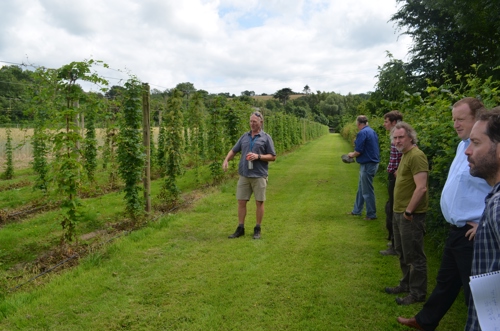
Using a Participatory Variety Selection approach involving the whole supply chain, this field lab aims to help organic and low-input hop growers find suitable varieties for organic farming showing desirable agronomic traits as well as the hop characteristics required from the market. The participatory approach enables evaluation within target environments seeking to find the most appropriate varieties for the farm rather than conventional breeding seeking broad adaption to non-organic production systems.
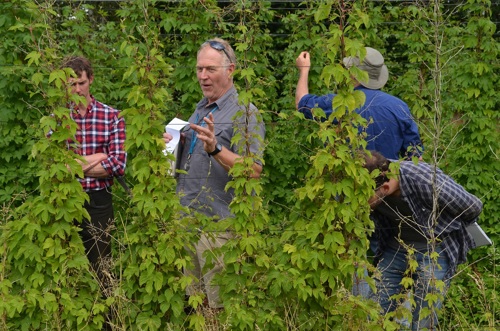
This report provides a basis for the required ongoing support of organic hop growers in the UK. The further research items detailed above highlight the importance of increased funding for organic hop research, not just for the research and development of novel pest and disease controls and management practices, but also for the continued selection and field testing of new hop varieties in organic systems. As detailed earlier in the report, there is a desire for resilient hop varieties in organic brewing and a number of advanced selections can be identified. The stakeholders require continued support and funding to continue testing these varieties on Organic Hop Farms to ensure their suitability. From consultation with the participating stakeholders, there also appears to be a desire and requirement for an open dialogue with the relevant certification bodies to discuss the potential use of alternative pest and disease interventions going forward.
Great Beer Debate at the Oxford Real Farming Conference
For the Great Beer Debate at Oxford Real Farming Conference, Stroud Brewery took their Oaty Ale - an all-UK Organic Pale Ale showcasing the first harvest of organic Harlequin hops from Woodlands Farm. It was very well received, and the bold fruity characteristics were well presented in the brew which utilised (the majority of) the 2022 organic crop. Conclusion for brewing characteristics - it provided bold and distinctive flavour and aroma as a UK grown hop. Stroud Brewery would certainly like to see the full harvest for 2023.
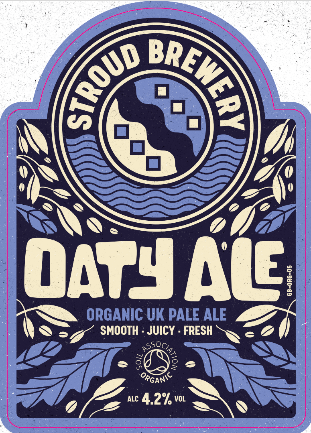
The debate itself was again a great opportunity to highlight the immediate challenges faced by UK hop growers to an informed audience, including the head of standards at SA.
Below is a summary of the year one results. The full end of year one interim report can be found at the results section of the field lab page.
The following observations were made by the growers following visits to CFHDP nursery and from assessment in on-farm trials at Lowergate Farm.
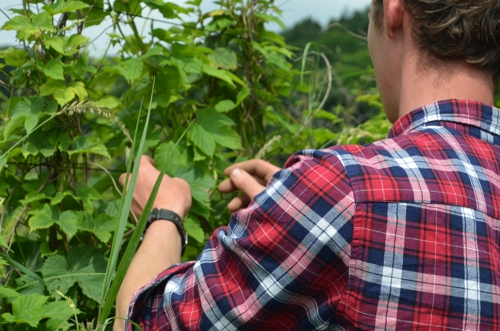
Field observations at Tedney House Farm
• Sovereign: Control
• Merlin: Showed high levels of powdery mildew; the farmer is considering removing it. Initially planted ½ acre then added four following the season. Regretted planting the additional without a proper trial
• 42/10: Showed signs of powdery mildew with low vigour
• 65/2011/24: Promising, vigorous, generally free from disease although some late season powdery mildew observed on some cones leading to premature ripening and some cone breakage
• 64/2011/26: Early signs of powdery mildew but infection did not take hold
• 12/2016/45: Wilt susceptible and discarded from the trial – deselected from the development programme due to susceptibility to wilt and powdery mildew
• Endeavour: Replaces 12/16/45 as a disease resistant dwarf type almost immune to powdery mildew and very tolerant of wilt but may have problems with late season downy mildew and aphids
Field observations at Lowergate Farm
• Challenger: Control
• Harlequin: Growth was moderate with 50% reaching eight foot in height. Precocious moderate crop harvested by hand from the strongest plants totalling 1kg. Disease resistance was excellent some red spider mite evident but dealt with via bio control
• Progress: Failure of most crowns to climb up the strings suspect waterlogging of the crowns. Crop failure - cured with ditching
• Pilgrim: Has a vigorous growth habit and provides a high yield, with good resistance to both powdery and downy mildew, and one of the most wilt resistant varieties
• 404: Early infection of downy but rapid response in growth. Very vigorous with bold cones weighing well
• 3294: Weak growth, poor crop. Not optimistic for its suitability but will commit to trial for three years.
One of the varieties they had intended to trial (12/16/45) had a wilted plant was judged unfit for the trial. This was replaced with Endeavour which is a dwarf hop from the Wye breeding program. It appears to fit their requirements in that it is quite disease resistant and produces a sound usable hop.
Variety 64/11/26. This was not quite ripe when observed and showed signs of powdery mildew on it earlier in the season. It will be planted but may not progress beyond the trial, which would be a pity as it has a higher Alpha which would be very useful to an organic brewer.
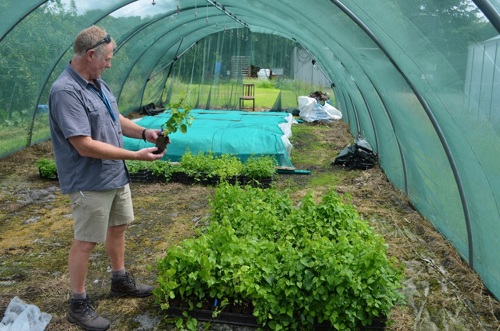
Variety 65/11/24. This still looks promising. A bit more vigorous, long thin cones towards the top of the plant, but apparently free from disease at the site.
They are hoping to get the plants in before Christmas if the weather allows.
The group met at John Walker's farm in Worcestershire and were shown around his hops yards, including the newly established varieties, followed by a visit to the hops nursery of Charles Faram, hops breeder. The discussions highlighted the layers of complexity and the challenges of hop growing. Key points include:
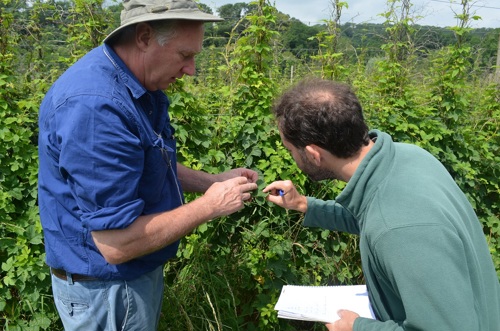
• Organic hops growers need to be constantly ahead of the game in terms of varietal selection. Diseases like wilt or mildew adapt, customer taste changes and pests like aphids or spider mites evolve
• A lack of genetic diversity is one of the main drivers of disease and pest vulnerability in hops
• With reduced permitted chemical intervention there is increasing need across industry for disease resistance in hops
• The organic setting may present reduced disease pressure due to better soil health, reduced nitrate inputs and natural predator banks
• Organic plants require certain characteristics - eg. initial growth/node length to out compete weeds
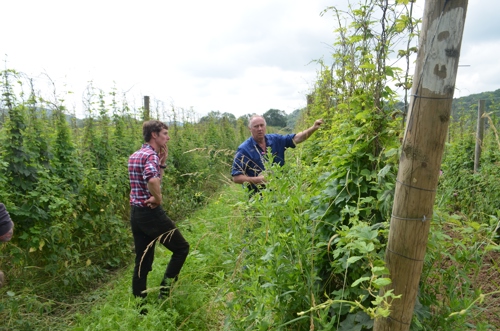
There was a need for supply chain understanding about comparative risks experienced by organic vs conventional hop growers (a case for and against organic production): crop losses, costs, premiums received, etc.
The trials are running over three years.
April 2021
June 2021
September 2021
December 2021
July 2022
July 2022
September 2022
September 2023
October 2023

Stroud Brewery
Stroud
Greg is Managing Director of Stroud Brewery. Greg worked with the Soil Association for 5 years principally as project Co-ordinator for the Cultivating Communities project which promoted and supported the development of Community Supported Agriculture (CSA). He is a founding member of Stroud Community Agriculture Ltd, a Community Co-operative which runs its own farm business, a Director of Stroud Common Wealth (supports social enterprise and community based asset management), and runs his own business – Stroud Brewery.

Organic Research Centre
Cirencester
In this section you will find reports and results from the field lab, as well as other relevant documents.

